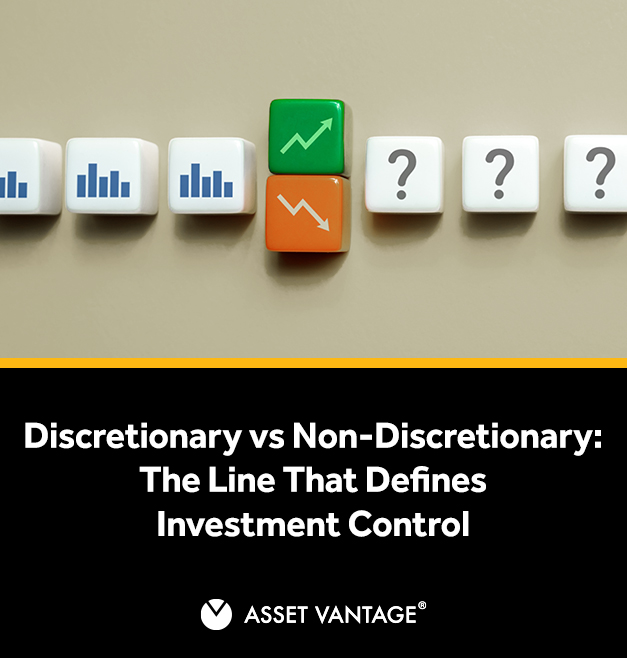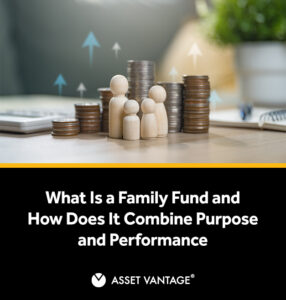Read Time10 Mins
Discretionary vs Non-Discretionary Account Control And Accountability
Every investment relationship begins with a question of control: who makes the trading decisions, when client approval is needed, and how authority affects timing, fees, and accountability.
The difference exists in how an advisor applies that authority within a client’s investment portfolio and how each structure influences accountability and timing.
The distinction between discretionary and non-discretionary accounts defines not only decision rights but also the rhythm of execution and governance that follows.
A discretionary account allows the advisor to make investment decisions and execute trades within a documented mandate. A non-discretionary account requires the client’s explicit consent before each action. Both models serve legitimate needs, but the outcomes they produce differ because control alters speed, responsibility, and the ability to respond to market signals. Choosing between them often depends on the investor’s tolerance for oversight and their need for a specific balance between independence and efficiency.
Key differences in control and accountability
- Decision-maker: Discretionary accounts delegate authority to the advisor; non-discretionary accounts retain control with the client.
- Timing: Discretion allows faster trade execution; non-discretionary models prioritize deliberation and review.
- Accountability: Advisors with discretion carry execution responsibility; clients in non-discretionary setups remain primary decision-makers.
- Oversight: Managed internal controls, approvals, and reporting cadence for account balances to match each investor’s comfort with delegation.
Control defines the tempo of portfolio management. A well-structured mandate ensures that neither speed nor oversight is compromised and that both the advisor and the client understand where their authority begins and ends.
What Is A Discretionary Account
A discretionary account grants the financial advisor limited authority to buy or sell securities on behalf of the client without prior approval for each transaction. This discretionary authority allows the advisor to act on their own judgment while aligning every move with the client’s risk profile and objectives. Within this framework, a written mandate defines the scope, instruments, and risk parameters, ensuring execution remains fast and disciplined.
In practice, discretionary accounts operate through documented control systems:
- Documentation: Letters of direction, mandate language, and reporting protocols make every action traceable and auditable.
- Operational checks: The framework depends on how well advisors and brokers record and reconcile the details generated by discretionary accounts at each trading cycle.
- Broker oversight: Most brokers maintain structured reporting to ensure each order or fund movement is backed by verifiable records that confirm accountability.
- Execution quality: The structure supports consistent decisions across investment funds or a linked bank account, where timing directly shapes return quality.
- Efficiency: This framework enables active investing in discretionary accounts to operate efficiently while maintaining compliance standards and timely decision-making.
Investors who prefer a hands-off approach value this model because it converts strategy into execution without procedural delays. Passive investors appreciate its simplicity, trusting professionals to manage within defined limits while acting at their own discretion. The success of a discretionary account depends on clear boundaries and mutual trust between client and advisor. Active investing discretionary accounts often perform best when advisors have clear authority, responsive communication, and well-defined oversight between the client and the broker.
What Is A Non-Discretionary Investment Account
A non-discretionary investment account keeps investment control in the client’s hands. A non-discretionary account means the advisor executes only when acting on the client’s instructions, ensuring that oversight stays entirely with the investor. The advisor can recommend trades and provide the broker’s advice, but execution requires the client’s explicit approval. This arrangement is suited for investors who want full participation in every trading decision and prefer to maintain personal oversight of their portfolio.
The model works best for clients who seek transparency and autonomy rather than delegation. It allows them to choose specific investments that align with their broader strategy while retaining the right to make decisions independently for each trade. Each transaction becomes a joint effort, with the advisor contributing market insight and the client determining the course of action. For each trade, the advisor’s role is limited to providing analysis and execution support once the client confirms the trade.
Key characteristics of a non-discretionary account
- Every order needs client consent before execution.
- Advisors focus on guidance, research, and risk disclosure rather than execution.
- Clients control timing and select individual investments based on personal priorities.
- Documentation captures advice, approvals, and communication trails for regulatory clarity.
While slower in response, this structure offers investors a sense of involvement and control. For many, the ability to approve or reject trades directly is central to their comfort with financial management.
Comparing Discretionary and Non-Discretionary Accounts
Once the two structures are understood, it becomes easier to evaluate how control, accountability, and execution speed differ. The table below summarizes how each model manages authority, timing, and responsibility across typical investment scenarios.
| Dimension | Discretionary Account | Non-Discretionary Account |
| Decision Authority | Advisor executes trades under a written mandate and defined limits using discretionary authority. | The advisor acts only on the client’s instructions and requires approval for each given trade. |
| Speed of Execution | Enables active investing in discretionary accounts where opportunities are time-sensitive. | Slower due to review and consent at every stage of trade approval. |
| Client Involvement | Best suited for passive investors seeking a hands-off approach managed under their own discretion. | Appeals to investors who prefer to make decisions independently and maintain tighter oversight. |
| Documentation and Controls | Relies on detailed mandates, letters of direction, and broker protocols. Most brokers maintain audit trails of all actions. | Records capture advice, approvals, and communication history for transparency. |
| Accountability | Advisor accountable for execution within mandate limits. | Client retains accountability for investment choices and timing. |
| Best Fit | Suitable when clients prioritize responsiveness and trust professional oversight. | Suitable when clients prioritize involvement, control, and review of every transaction. |
Why Control Shapes Financial Goals In Investment Management
Control defines how effectively an investor’s strategy converts into measurable results. Small shifts in decision rights influence how quickly portfolios rebalance, how efficiently good trades are captured, and how consistently an investor protects long-term interests. In investment management, control is not just procedural; it determines how responsive the portfolio is to opportunities and risks.
Every investor’s comfort with authority differs. Very few individual investors want the same approval cadence. The right model balances authority and participation; a hands-on approach offers greater oversight, while a hands-off approach prioritizes speed and delegation. The closer the model aligns to individual financial objectives, the more consistently execution supports long-term goals.
Active management depends on clear authority within the mandate to act when markets move quickly. More active management magnifies timing risk, making review cadence and documentation critical so that required approvals do not delay decisive execution. When authority, trust, and reporting cadence are aligned, control becomes a tool for better outcomes rather than a constraint.
How A Discretionary Investment Account Works Day To Day
A discretionary account operates through a clear sequence of approvals and confirmations that define how decisions move from advice to execution. Brokerage firms design these workflows so the advisor can execute trades within predefined mandate limits, ensuring every action aligns with the client’s strategy and risk boundaries. This structure supports long-term position building while preserving audit-ready records of every order.
Typical daily workflow in a discretionary account:
- Trade Identification: The advisor monitors the market for opportunities that match the client’s objectives or rebalancing needs.
- Mandate Validation: Before each trade, internal systems verify that the proposed action falls within the documented mandate limits.
- Execution and Confirmation: Once validated, the trade is placed immediately through the brokerage desk, and confirmations are shared with the client’s reporting portal.
- Record and Review: All activity is logged for compliance, pricing accuracy, and performance tracking across the investment portfolio.
- Timely Adjustments: When market windows are brief and the broker sees a timely entry, the advisor can act quickly within the mandate limits to strengthen long-term positioning.
This process keeps discretion disciplined, enabling speed without losing transparency. The balance between authority and accountability ensures that each trade serves both immediate opportunity and the client’s broader investment intent.
Guardrails, Permissions, And Order Workflow For A Managed Account
Transparent governance defines trust in a managed account. Mandates, letters of direction, and scope language specify who can access money and under what conditions actions can be taken. These instruments determine when final approval is required to sell assets and when the advisor may act under time-and-price discretion. Together, they create the framework that keeps independent authority aligned with documented boundaries and client intent.
Defined Roles and Rights
| Control Area | Client Rights | Advisor Rights |
| Account Access | Approves funding and withdrawal instructions. | Access limited to trading within mandate limits; cannot move funds. |
| Trade Execution | Reviews activity through periodic reports or dashboards. | Executes trades using time-and-price discretion within defined authority. |
| Final Approval | Retains authority to approve or deny large asset sales or reallocations. | May act immediately on minor transactions consistent with the strategy. |
| Legal Rights and Documentation | Holds ownership and full title to all assets; defines legal boundaries. | Operates within the letters of direction and mandate, ensuring traceability. |
Core Governance Documents
- Mandate Agreement: Establishes scope, permitted instruments, and documented boundaries for authority.
- Letters of Direction: Grant limited powers that allow action on pre-defined instructions without additional signatures.
- Scope Language: Clarifies the purpose of discretion and outlines escalation rules for exceptions.
- Approval Matrix: Maps when final approval is mandatory before selling or reallocating.
- Audit Trail Policy: Ensures that each transaction remains visible, timestamped, and fully attributable.
Strong documentation turns discretion into discipline. When guardrails are explicit and reviewed regularly, independent authority becomes a source of operational efficiency rather than a governance risk.
Where Discretionary Investment Adds Speed And Where It Should Not
The power of discretion lies in timing. It can be a huge benefit for time-sensitive moves or for certain investment ideas where market entry determines potential returns. When applied with clear limits, discretion strengthens execution without compromising oversight. It should accelerate opportunity, not replace judgment.
Discretion delivers value in more minor adjustments, tactical shifts, and quick rebalancing. Yet significant reallocations that alter portfolio direction or risk exposure still require client approval. The goal is to react quickly where flexibility adds efficiency, and to pause when strategic or emotional stakes demand shared decisions. A hands-on approach is best reserved for complex instruments or situations that require greater control and layered verification. Avoid the extreme approach mindset that treats speed as a strategy and overlooks the purpose of guardrails.
When to Use vs. When to Avoid Discretion
| Scenario | When to Use Discretion | When to Avoid Discretion |
| Trade Size | Small tactical trades that fine-tune exposure. | Major shifts or significant reallocations that redefine the portfolio. |
| Market Timing | Time-sensitive moves that require the advisor to act instantly. | Illiquid markets or high-volatility periods that require client review. |
| Instrument Type | Straightforward securities or certain investment ideas with clear price transparency. | Complex instruments that need valuation checks or board-level review. |
| Governance Control | Documented guardrails define limits clearly. | Missing or outdated mandates that blur accountability. |
| Client Engagement | Routine updates maintain visibility while discretion runs efficiently. | Any instance where the client seeks more control or formal approval. |
The balance is precision. Use discretion to seize opportunity within mandate limits, but keep the guardrails visible so agility never erodes accountability. When both speed and supervision coexist, discretionary management achieves its purpose: timely execution backed by transparent governance that protects what is extremely important to the client.
Cost, Reporting, And The Key Differences That Matter
Cost structure and operational transparency define the practicality of any managed account. Investors often compare lower minimum investments, performance reporting, and audit trails before choosing between discretionary and non-discretionary models. Understanding how orders, records, and billing differ across these structures clarifies the true cost of control.
While brokerage control can improve day-to-day efficiency, it also concentrates responsibility for trade accuracy, reconciliation, and data integrity. Lower management costs may look attractive at first, but can shift workload to the client if reporting, permissions, or communication cadence are not aligned. The strongest outcomes occur when fees, reporting, and authority operate within a single, consistent framework.
Cost and Reporting Comparison
| Dimension | Discretionary Account | Non-Discretionary Account |
| Minimum Investment | Often offers lower minimum investments due to automated execution and scale efficiency. | May require higher balances to justify manual review and frequent interaction. |
| Fees and Billing | Advisory fees are predictable and linked to account value; they are billed on a defined schedule. | Transaction-based costs; billing depends on trade frequency and approvals. |
| Audit Trails | Continuous audit trails ensure trades are automatically validated and reconciled. | Manual verification of trades; audit evidence collected through post-trade statements. |
| Reporting Cadence | Integrated systems provide real-time dashboards for performance and compliance reporting. | Reports are periodic and rely on external confirmations from the brokerage. |
| Operational Workload | Brokerage control centrally manages execution, settlement, and compliance. | Clients handle coordination, often increasing administrative oversight. |
Key Insights for Investors
- Efficiency vs. Effort: Automated discretion improves execution but demands trust in data integrity and control systems.
- Hidden Costs: Lower management costs can increase client-side workload if back-office coordination or reporting cadence weakens.
- Alignment: Best results occur when fees, reporting, and authority remain transparent and proportionate to service scope.
- Scalability: Firms that maintain unified systems for orders and records offer better audit readiness and governance.
The most significant benefits arise when cost discipline, transparent reporting, and defined authority reinforce one another rather than compete for control. Transparent cost and reporting systems turn discretion into discipline. When data, billing, and accountability align, both client and advisor gain measurable efficiency and confidence in every decision.
Selecting The Right Investment Account For Informed Decisions
Choosing between discretionary and non-discretionary structures begins with clarity on goals and process. Map the structure to the underlying investment strategy and how you make investment decisions across a specific portfolio. The decision is not only about cost or reporting style; it’s about matching authority with comfort and accountability.
Decision filters to guide selection:
- Speed of Execution: Investors seeking faster execution and timely trades may prefer discretion, where the advisor acts immediately within mandate limits.
- Control and Oversight: Those who prioritize their own trading decisions and want review checkpoints before the advisor acts often choose non-discretionary accounts.
- Governance Preference: Independent operators or family offices that value documentation and defined authority lean toward structured oversight.
- Risk and Delegation Comfort: Select the model that reflects your comfort with delegation and your threshold for independent decisions under continuous oversight.
- Portfolio Complexity: Complex portfolios benefit from defined mandates and automated discretion; simpler holdings can sustain manual approvals.
Each model works when its control framework aligns with investor temperament and operational rhythm. The right choice turns governance into a strength, enabling more brilliant execution without compromising transparency.
Service Expectations For Clients
Consistency defines confidence. Before granting significant authority, investors should evaluate staffing depth, platform access, and advisor matches across all servicing locations. Many investors operate through multiple offices or family entities, so confirm how brokerage firms coordinate operations to keep approvals and records aligned across systems.
Strong communication and unified data standards ensure that every instruction, approval, and report travels seamlessly between advisors and regional teams. Operational clarity across regions is the foundation of trust; it proves that discretion scales without losing accountability.
Governance For Discretionary And Non Discretionary Accounts, Red Flags, And Advisor Selection
Sound governance keeps control aligned with intent. Establish a review cadence, define evidence standards, and document escalation rules that protect best interests while keeping routine orders efficient. Governance should enable speed with structure, giving discretion the precision it requires.
Key governance practices for both account types:
- Review Discipline: Schedule periodic reviews that confirm activity within mandate limits and highlight exceptions early.
- Evidence Standards: Maintain traceable confirmations for every instruction, approval, and executed trade to support compliance checks.
- Escalation Rules: Set clear thresholds for when issues move from advisor review to client notification or legal counsel.
- Anomaly Tracking: Track anomalies quickly via system alerts to prevent misallocation or breaches that could resemble investment fraud.
- Advisor Selection: Evaluate advisors not only on performance but also on their adherence to documentation and escalation protocols.
- Legal Readiness: Verify legal rights in engagement letters and arbitration clauses to enable swift arbitration if required.
Governance transforms discretion into reliability. When oversight, escalation, and accountability coexist, both discretionary and non-discretionary models safeguard performance and trust across every account.
Summary and Decision Guide,
The best account structure balances independence and oversight. Use the chooser to identify which structure aligns with your oversight tolerance, timing needs, and personal finance priorities. Each decision point determines how quickly trades can move, how accountability is shared, and how governance remains visible.
Checklist for investors before finalizing an account type:
- Clarify objectives: Define what you expect from discretion: speed, control, or predictability.
- Assess oversight tolerance: Decide how much day-to-day authority you are comfortable delegating.
- Review timing needs: Match your review cadence to trading frequency and strategy complexity.
- Document roles: Clearly define roles for both the client and the advisor to prevent confusion during execution and reporting.
- Verify authority boundaries: Ensure advisors act with independent authority only where permitted by mandate language.
- Confirm approval process: Establish when seeking client approval is mandatory and when the advisor may proceed automatically under documented authority.
- Maintain audit readiness: Keep records, performance reports, and mandates synchronized across all accounts.
Transparency turns documentation into trust. The right structure gives clarity on who decides, who executes, and how both remain accountable through every trade.
Disclaimer:
This guide is for informational purposes only and does not constitute investment, legal, or tax advice. Investors should consult their financial, legal, or tax professionals before making any investment decisions or selecting an account structure.







